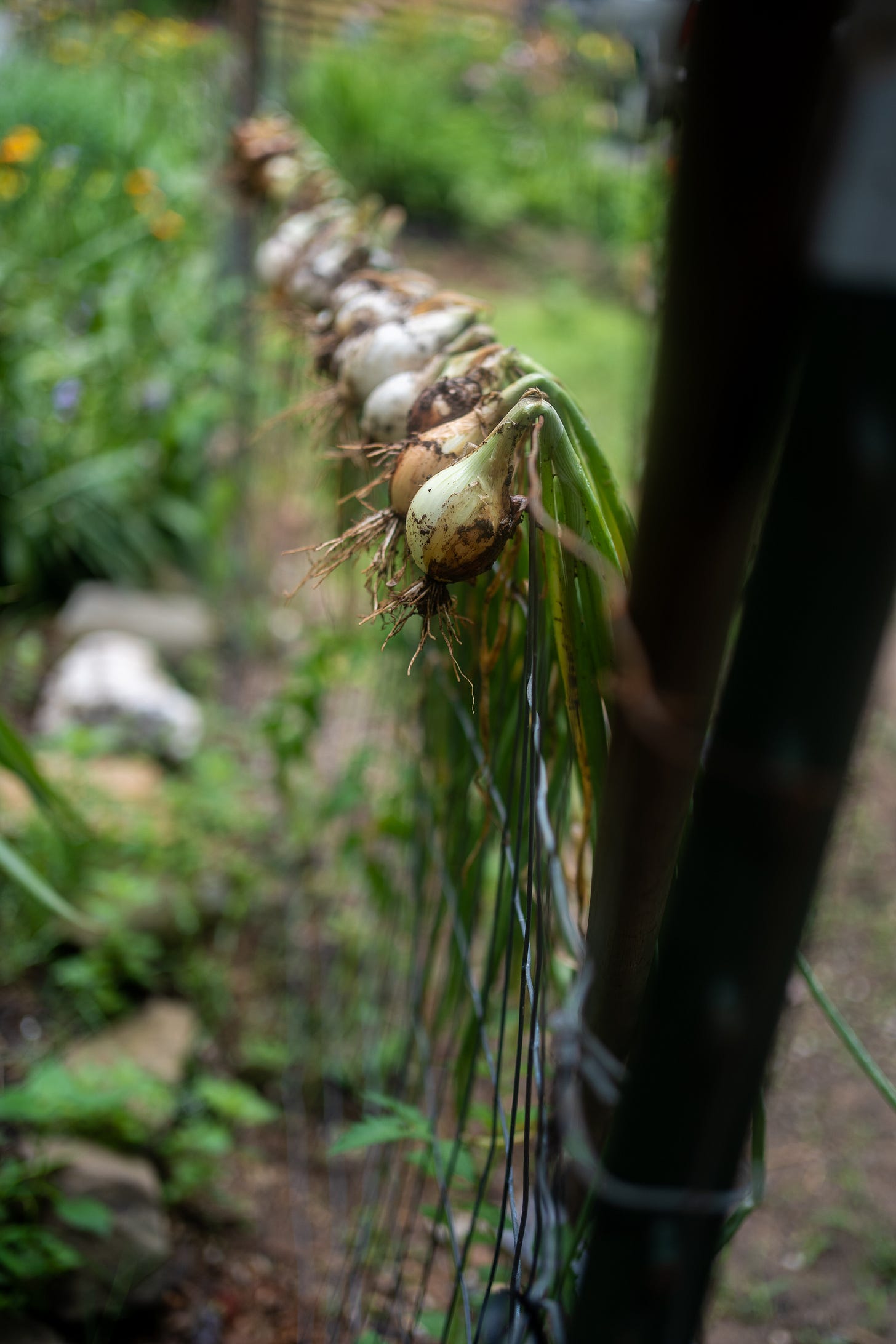
Every gardener has a love-hate relationship with the onion. I’ve been gardening for well over a decade, and I just recently learned that I can plant my onion seeds or onion starts in the fall so that I have a spring harvest. Most gardeners start their seeds and plant their starts in the early spring in order to reap a summer or fall harvest.
While most of America sees the onion as just a flavor enhancer for their weeknight dinner, the mighty onion can be used for quite a few things more than just food. Throughout history, onion (Allium cepa) has been used medicinally. Maybe because most people had it readily on hand. Or maybe most people had it readily on hand because of its useful medicinal actions.
Medicinal History of the Onion
Historically, European herbalists saw that onion had antiseptic and diuretic properties (Grieve, 1979). In Germany it has been approved for a limited treatment of the hardening of arteries and plaque build up. Of course, we now know that the hardening of arteries and plaque build up come from the breaking down of your artery walls. Cholesterol build up is actually the body’s process of trying to plug those holes so that you don’t bleed out. Therefore, doing a good job of keeping you alive while you abuse your body. But that’s another topic for another day.
Onion has also been historically cooked in milk and eaten in order to clear congestion in the lungs (Shultz et al., 1998). In fact, it’s used a lot for respiratory issues throughout history.
Amy K. Fewell | Homesteading for the Kingdom is a reader-supported publication. To receive new posts and support my work, consider becoming a free or paid subscriber.
Home Remedies with Onion
The home remedy of raw and warm/cooked onions are a bit different. They have a few different actions whether the onion is raw or warmed (though not completely cooked).
Earache
I personally like to use garlic oil for earaches, but sometimes—especially in babies—it can be difficult or too warm. Warming up an onion, or cooking it just slightly, wrapping it in a very thin cloth, and then placing it on the ear will help soothe the earache and naturally remedy the infection.
Sometimes the body will naturally “rupture” the thin eardrum to release infection. This can happen with any ear infection, even with antibiotics. So small, in fact, that you don’t even know your eardrum has ruptured. This is typically what happens when the body naturally creates that hole.
However, if you were to stick something in your ear that causes a rupture, it will absolutely hurt. For this reason, of some smaller children, it may be more efficient to use the onion instead of the garlic oil. Their eardrums are much smaller and already have quite a bit of pressure behind them with the infection.
The ear infection should clear on its own in three days, but relief will begin almost immediately when using the onion every few hours.
Boils & Cysts
Boils and cysts under the skin are very painful. The quickest way to feel relief is for them to rupture, however, that process can take three to seven days before it fully happens. Even then, some boils and cysts don’t rupture all the way.
We use a warm onion on the cyst or boil to help draw the infection and bring it to a head more quickly. In the meantime, it also has a soothing effect on the skin.
Place the onion on the infected area, wrap it, and wear it overnight. Within 24-hours or so, the infected area will come to a head. You can remove the onion and allow the boil or cyst to drain completely.
Follow up with a natural antiseptic and healing salve, such as oregano, tea tree, calendula, or lavender.

Join Amy K. Fewell’s subscriber chat
Available in the Substack app and on webJoin chat
Coughs
One of the most simple remedies in the home herbalist’s medicine cabinet is an onion and raw honey. I can’t tell you how many times I’ve made this simple cough syrup with extremely efficient effects.
Raw Onion & Honey Cough Syrup
In a glass jar, place a thinly sliced raw onion. Cover the slices completely with raw honey—just enough to cover the slices. Shake well and allow to sit for several hours.
After three hours you’ll see a thin syrup creating. Once you see this, you can use it. However, for the most efficiency, wait 24 hours.
Strain the onion from the honey, and store in the fridge (in an airtight jar) indefinitely.
Raw Onion on the Feet
While the raw onion and honey works great during the day, a better option at night is raw onion on the bottom of the feet.
Take an entire raw onion and again, cut into slices (though they don’t have to be as thin this time). Place half of the onion on a cloth, towel, or wool cloth. Wrap it with plastic wrap, or simply place a sock on the foot after you’ve placed the onion and cloth on the bottom of the foot. Do this for both feet and leave on all night long. This will help suppress the cough at night.
“Compounds from onion have been reported to have a range of health benefits which include anticarcinogenic properties, antiplatelet activity, antithrombotic activity, antiasthmatic and antibiotic effects.”
Onions—A global benefit to health — Gareth Griffiths; et al.
Sore Throat
I’ll admit, onion is not my goto for a sore throat. However, it can help with a sore throat. The same practice applies when using the onion. Often times, onion must touch the area that is affected, as with many other herbs.
Simple wrap raw onion slices in a cloth and place directly on the sore area for at least 4 or 5 hours. Overnight is best. It helps many people, but there are others who say it simply doesn’t work. A sore throat is a difficult thing to remedy without figuring out the root cause.
Often times my go-to for a sore throat is a sage and cayenne gargle first, then followed by the onion if necessary.
Onion and Mucus Membranes
We’ve talked specifically about cough, sore throat, and skin issues when it comes to the home remedy of onion. But why does it work? What’s so special about the onion? Once you know the “why”, you’ll never forget it. And even find more ways to use it.
1For starters, the onion has the ability to break down the mucus membranes in your body. This is abundantly evident when you cut an onion and you begin to cry. This is because onions are full of sulphur. Sulphur is what is released into the air, therefore causing the reaction in your mucus membranes.
Have you ever wondered why mustard gas causes people to have profuse drainage from the eyes, mouth, and nose when they come into contact with it? It’s because of sulphur (on a more extreme level, of course).
The same is true for the sulphur in onions. Because there are sulphuric properties in the onion, it does an incredible job at breaking down mucus membranes in the body. Hence, why it’s fabulous for coughs and colds. You just have to find the right dose for yourself or your loved one.
Likewise, it helps to gently break through barriers, such as the ear drum for ear infections, and the skin and lining of the boil and cyst.
Moral of the story…
The next time you’re looking at that onion thinking it’s only good for eating and seasoning, realize that you have a master medicinal plant right in your very own kitchen. One that has been used for, literally, centuries. A commonplace that can be grown right in your very own garden bed.





Leave a Reply